Offering healthy and happy baby chicks doesn’t happen by accident. In fact, proper care and nutrition to help ensure optimal growth is provided to the source flocks through a dedicated person, years of experience and a genuine enthusiasm about chickens. As I continue to learn more and more about the workings of Murray McMurray Hatchery, I wanted to see the sources of the thousands of baby chicks that we get to send to new homes each week. Hitching a ride with Kent, our egg hatcher extraordinaire, we ventured out to the various Murray McMurray Hatchery flock farms to get a look at the mom and pops of our baby chicks, their environment, and the dedicated care takers we entrust them with.
It was a beautiful morning in Iowa, the sun was bright and the sky was a clear blue that offered a long view of the flat landscape. Even though it was the end of January, the day’s high temperature was to be a welcomed 55 degrees. Our drive in the Jeep this morning took us through wind turbine farms that decorated the empty corn and bean fields. Being the new guy in the operation, I took advantage of the opportunity to tap into the mind of a veteran chicken expert like Kent and started with my rampage of questions. As I looked over the back of the Jeep, I noticed several sets of coveralls, masks, boots, and plastic bags. Naturally, my first question was, “Kent, what are we getting into today?” It would soon be evident that I might want to leave my coffee in the Jeep while we conducted our work.
We would visit five different farms today, each unique in their set-up yet similar in their country lifestyles that showcased the results of dedication and hard-work. Tractors were present in the backdrop of the properties, along with the occasional tree house and tire swing. For most, raising chickens was a family affair that required all hands on deck especially during the planting and harvest seasons. While the welcomed arms greeted us onto each property, the casualness of the pleasantries and conversations could not be confused with the high attention to detail that our particular work visit required this day.
I slipped on my plastic boot covers, zipped up the full body coveralls and put on my mask. I felt like I was back in chemistry class but the absence of Mrs. Deters’ panicky “What did you do?” followed by a ringing of a fire alarm assured me this would be a safer adventure. We were about to conduct a little experiment – one that Kent routinely does throughout the year, at each farm, as a proactive measure to ensure our chicks have the best health, even before they are born.
Upon entering each building, Kent took out two slip-on nylon booties and put them over his plastic boots. He then walked around inside each chicken coop making sure he covered the area well in his path. The chickens’ excitement to see Kent was obvious as they ran around the coop, circling him, some flying to the other side. It reminded me of when I come home from work and seeing my children running excitedly around the room yelling “Daddy’s home, daddy’s home!”
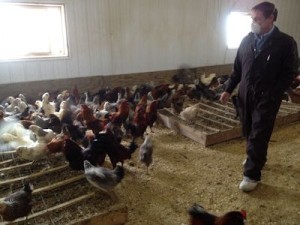
As we walked through the coop and collected the remnants of the coop on the booties, Kent closely inspected the environment. He reviewed the nesting boxes, the roosts and of course the chickens. Kent would pick up a chicken and intricately review him looking at his feathers, his feet, beak and more. After the inspections, we exited the coops. Kent removed each bootie, placed them in their respective Ziploc bag and marked each with the designation of what coop, what building and what farm it was collected from.
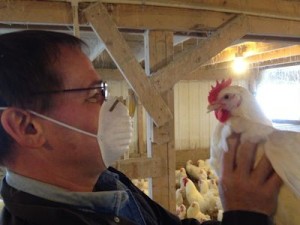
We exited the barn and headed back to the Jeep. Coveralls were removed and placed into a trash bag. Next, the mask and booties were removed and placed into a separate trash bag to be discarded. As we drove out of the farm and onto the road, Kent stopped the Jeep – there was one more thing to do. He got out a canister of disinfectant and sprayed the jeep’s tires and undercarriage to remove any remnants of the previous farm.
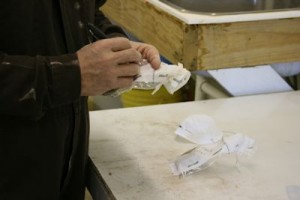
Again, the natural question arose, “Kent, what’s the deal with changing clothes, boots and spraying disinfectant every time?”
The proactive measures are all part of a plan to ensure the baby chicks are born healthy. Kent makes several trips a year to inspect the farms for salmonella and other harmful poultry diseases. Murray McMurray Hatchery participates in the National Poultry Improvement Plan of the US Department of Agriculture program and we operate under the inspection of the Iowa Department of Agriculture. We have made major investments in our flocks and our flock managers to ensure your baby chicks have the very best start, even before they are born. At the end of the day, the booties that Kent wears into each coop are sent off to Iowa State University, where they are tested for a wide range of poultry disease evidence.
While this may sound like a lot of technical hoopla, it really is a wonderful way to be proactive in flock management and relates to some common precautions that you can easily integrate into your flock management as well. In fact, page 6 of the Murray McMurray Hatchery 2012 catalog offers a wealth of information on healthy chicken management habits.
Risk factors of transferring disease increase significantly when you travel from one farm to another, or from one chicken owner’s house to another. Car tires, tractor tires and garden tools, if not disinfected, can transfer disease as well. The overall idea is to ensure your boots, clothes, tires, tools, or cages are cleaned well and disinfected if they travel from one coop to another.
Think of each person’s farm or chicken coop area as a large piece of white carpet. You wouldn’t walk on your neighbor’s white carpet without first cleaning your shoes, or taking them off entirely, right?
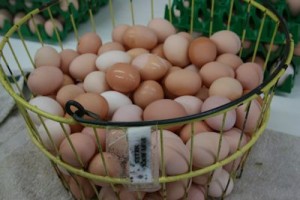
Similarly, you wouldn’t want to bring a disease from your flock to your neighbor’s flock. The way to ensure this doesn’t happen is proper maintenance of your attire, tools, etc., or best yet, have a designate pair of boots and clothes to use when managing your pens or coops and limit the exposure of those items to within your barn, shed or garage. Doing such will help drastically reduce the opportunity for disease to be transferred.
Murray McMurray Hatchery takes great pride in the baby chicks we can offer our thousands of customers. It was wonderful to see the roots of these chicks and know, even before they are born, that they have been thought about and cared for, through the proper raising and nutrition of their mom and pop.

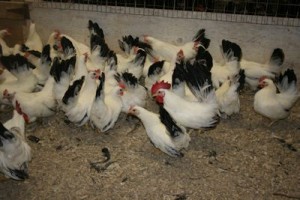
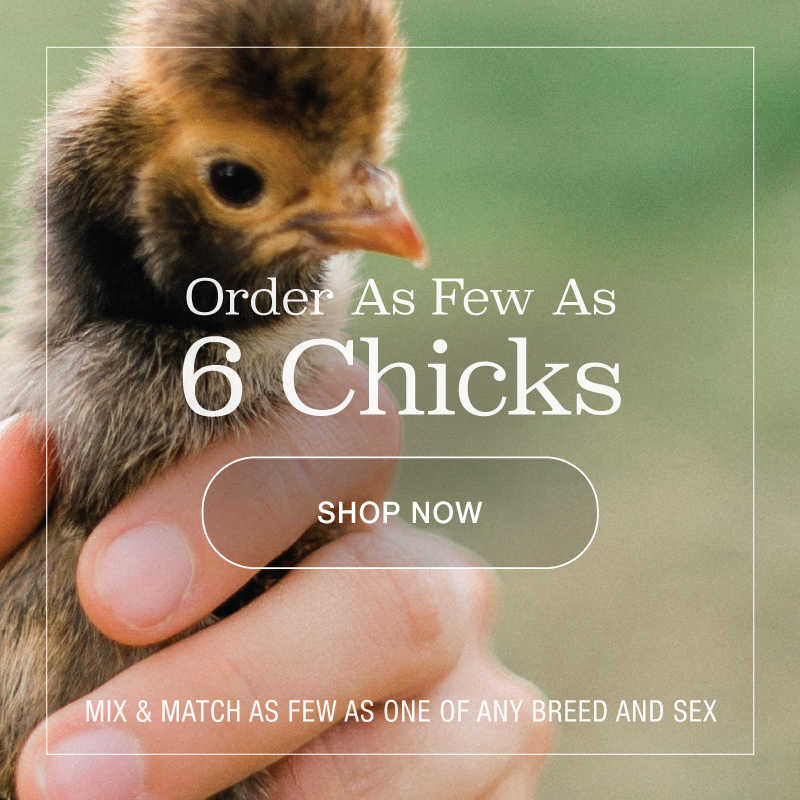

I have a problem with my chickens they shed feathers almost twice a year I was thinking that summer time it’s too hot for them to have feathers cause we live in Pahrump NV but not this time of the year they look awful without feathers please tell me what I’m doing wrong I feed them with egg maker so they will lay eggs I give them green veggies bur not all the time and I also give them cracked corn so I need your expertise in caring for my chickens especially now that I got very pretty chicks from you guys I also have 4 bantams I’m so excited can’t wait for there feathers to grow. Thank you I hope to hear from you
Moulting once a year is normal… Feathers need protein; be careful on the cracked corn.. great filler but NO nutritional factor… don’t want them filling up on corn and not the good feed…… Also check for feather picking… (bad habit that can run rampid,once they get going)…. Also check for fleas/mites… add vitamins to diet as well
Hi Chris,
I’ve been a Murray McMurray customer for many many years, and I hope you’ll enjoy working with them. I noticed your other blog about what breed to start with, which for some reason I can’t respond to. In all the years I’ve raised chickens and other birds (pretty much all my life) I’ve had a great variety, and my advice would be…let your little girl pick out the one(s) she likes! Certainly from an economic standpoint the commercial breeds outperform the fancies, but in a hobby flock the differences are minimal. After all, the high production of the commercial breeds also requires high inputs in commercial feed, supplements, lighting, etc. As a general rule, I’d say that the larger American, Asian, and British brown egg laying breeds are probably calmer and more docile and would make better pets than the lighter breeds like Leghorns, Andalusians, etc. Bantams might be an option as well, although bantam roosters can be quite feisty. Another factor to consider is whether you want to hatch your own chicks naturally or not. In that case you may want a naturally broody breed. Although that can vary tremendously among individuals. I had a black sex link (a supposedly non-broody commercial breed) that was one of the best setting and mother hens I ever had, and a Buff Orpington (a supposedly excellent setter and mother) that never showed the slightest tendency to broodiness. I’ve never had a breed of chicken that I didn’t like, in fact the only breed of anything I’ve ever raised that I don’t particularly like are Chinese geese; in my experience they are mean and aggressive, esp. to other birds in a mixed flock. Ducks might also be a possibility, they are friendly, funny, extremely hardy and easy to raise. As with chickens the larger breeds like Rouens or Blue Swedes tend to be calmer than the light-weight ones like runners. But working with Murray McMurray, you and your little girl have the unique opportunity to get to know them all! I presently have 2 Hamphshire Reds and one Delaware hen from McMurray, plus a half a dozen mix-breed blue Andalusians whose descendents also came from McMurray. My remaining 23 hens are Rhode Island Reds and Barred Rocks that I got as chicks last spring from our local feedstore. One last piece of advice…be sure your pen/coop is predator-proof!! Predators (raccoons, hawks and owls, black snakes, and perhaps worst of all, dogs) by far are the worst problem I’ve ever had. And I can’t imagine how upset your little girl would be to find her pets killed. The only sure fire way to keep predators out is a predator-proof coop and a pen with a top, at least for nighttime use. You can probably let your birds out safely in a larger, dog-proof fenced-in area during the day, as long as there is natural cover where they can get away from hawks.
Other than that, enjoy!
Thank you for the suggestions!